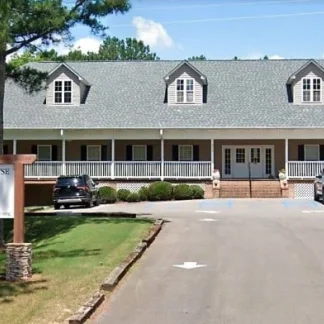Etowah Rehabilitation Services
Etowah Rehabilitation Services is a private rehab located in Gadsden, Alabama. E...
CED Fellowship House offers co-occurring drug and alcohol addiction treatment for men in Gadsden, Alabama. CED Fellowship House aims to promote the educational, cultural, and social skills of men who are struggling with physical, emotional, or mental disorders induced by excessive alcohol use.
Committed to helping individuals overcome co-occurring substance use disorders and achieve lasting recovery, CED Fellowship House provides a structured environment where men can embark on their journey to sobriety.
CED Fellowship House offers a 28-bed residential drug rehab program to support men in their recovery from substance use disorders and co-occurring mental health disorders. Residents gain complete re-socialization in a homelike setting with the support of outside 12-Step groups such as Alcoholics Anonymous, Narcotics Anonymous, and other approved self-help groups.
The facility also provides individualized treatment planning to create a personalized roadmap for each resident. Through comprehensive assessments and collaborative discussions, the team at CED Fellowship House develops treatment plans that address the specific needs and goals of each individual.
At CED Fellowship House, individuals receive 24/7 support and supervision to ensure their safety and well being. Trained staff members are always available to provide guidance, assistance, and support, as residents progress through their recovery journey. The supportive environment encourages individuals to develop healthy coping mechanisms, build resilience, and foster a sense of community.
Contact us for more information: (256) 413-3470

Connect with CED Fellowship House by calling their admissions team directly.
(256) 413-3470 Website Get DirectionsGroup therapy is any therapeutic work that happens in a group (not one-on-one). There are a number of different group therapy modalities, including support groups, experiential therapy, psycho-education, and more. Group therapy involves treatment as well as processing interaction between group members.
In individual therapy, a patient meets one-on-one with a trained psychologist or counselor. Therapy is a pivotal part of effective substance abuse treatment, as it often covers root causes of addiction, including challenges faced by the patient in their social, family, and work/school life.
Trauma therapy addresses traumatic incidents from a client's past that are likely affecting their present-day experience. Trauma is often one of the primary triggers and potential causes of addiction, and can stem from child sexual abuse, domestic violence, having a parent with a mental illness, losing one or both parents at a young age, teenage or adult sexual assault, or any number of other factors. The purpose of trauma therapy is to allow a patient to process trauma and move through and past it, with the help of trained and compassionate mental health professionals.
In individual therapy, a patient meets one-on-one with a trained psychologist or counselor. Therapy is a pivotal part of effective substance abuse treatment, as it often covers root causes of addiction, including challenges faced by the patient in their social, family, and work/school life.
Trauma therapy addresses traumatic incidents from a client's past that are likely affecting their present-day experience. Trauma is often one of the primary triggers and potential causes of addiction, and can stem from child sexual abuse, domestic violence, having a parent with a mental illness, losing one or both parents at a young age, teenage or adult sexual assault, or any number of other factors. The purpose of trauma therapy is to allow a patient to process trauma and move through and past it, with the help of trained and compassionate mental health professionals.
Trauma therapy addresses traumatic incidents from a client's past that are likely affecting their present-day experience. Trauma is often one of the primary triggers and potential causes of addiction, and can stem from child sexual abuse, domestic violence, having a parent with a mental illness, losing one or both parents at a young age, teenage or adult sexual assault, or any number of other factors. The purpose of trauma therapy is to allow a patient to process trauma and move through and past it, with the help of trained and compassionate mental health professionals.
Etowah Rehabilitation Services is a private rehab located in Gadsden, Alabama. E...
Grandview Behavioral Health Center is a drug and alcohol rehab and medical facil...
Excel Institute is a private rehab located in Gadsden, Alabama. Excel Institute ...
Riverview Regional Medical Center is a drug and alcohol rehab and medical facili...